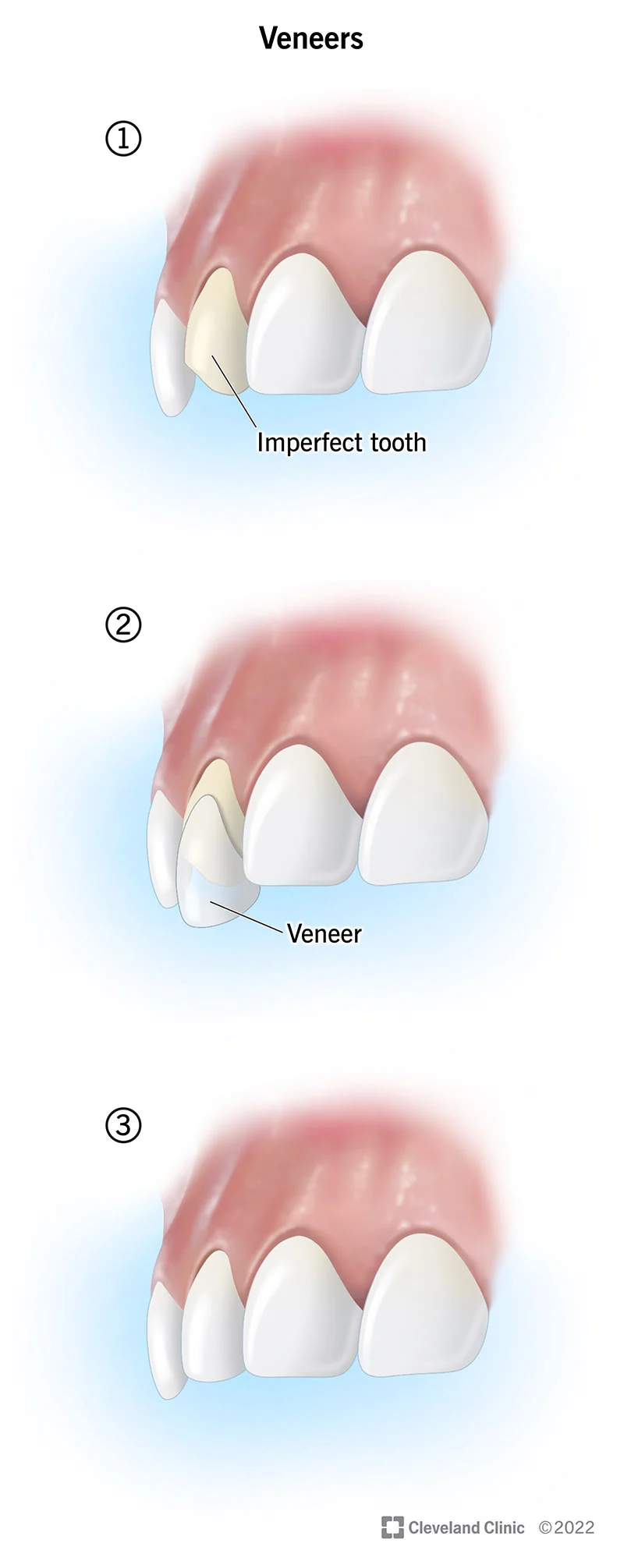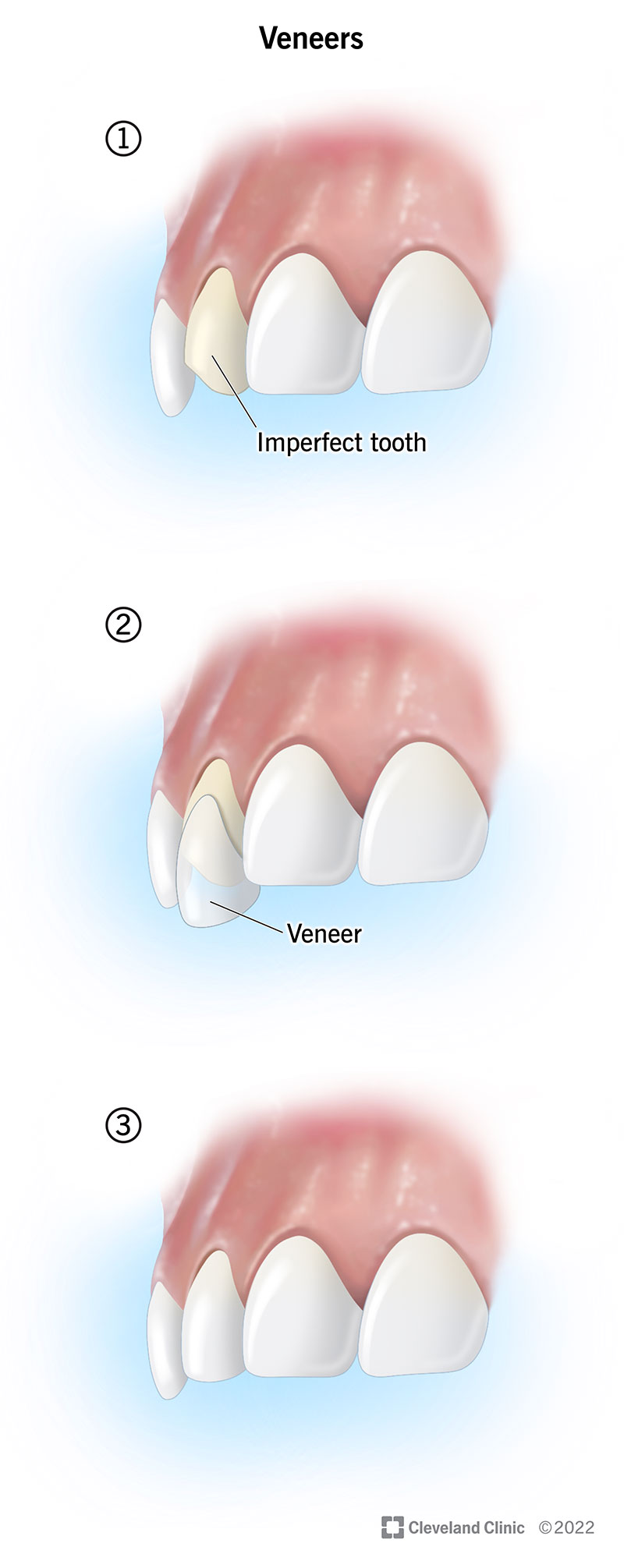
Dental veneers are custom-made, thin shells made of porcelain or composite resin that are bonded to the front surface of natural teeth. They serve to enhance the appearance of teeth by covering imperfections like stains, chips, or gaps. The process involves removing a small amount of enamel, taking impressions, and then attaching the veneers with dental cement. This cosmetic solution offers a natural-looking and durable remedy for various dental issues, providing individuals with an improved and aesthetically pleasing smile.
How Do Dental Veneers Work?
Dental veneers are a popular cosmetic dental treatment that can transform the appearance of your smile. Veneers are thin shells made of porcelain or composite resin that are custom-made to fit over the front surface of your teeth. They are designed to improve the color, shape, size, or length of your teeth, giving you a more aesthetically pleasing smile. But how exactly do dental veneers work? Let’s dive into the process and find out.
1. The Consultation and Planning Process
- Scheduling the Initial Consultation: The first step involves scheduling a consultation with your dentist to discuss your goals and expectations for dental veneers. X-rays and impressions will be taken during this appointment to create a model for designing custom veneers.
- Collaboration with Dental Laboratory: After the initial assessment, your dentist collaborates with a dental laboratory to create custom veneers. Factors such as the color, shape, and size of natural teeth, along with your desired outcome, are considered to ensure a seamless blend with your existing teeth.
2. The Preparation Process
- Enamel Removal: Before veneers can be placed, a small amount of enamel is removed from the front surface of your teeth. This creates space for the veneers and ensures a proper fit. Local anesthesia is administered, and a dental drill or laser is used to gently remove the thin layer of enamel.
- Temporary Veneers: While waiting for the permanent veneers, temporary ones may be placed to protect your teeth and maintain your appearance.
3. The Veneer Placement Process
- Cleaning and Preparation: When the permanent veneers are ready, you return for placement. Your dentist cleans and prepares your teeth, possibly etching the surface and applying a bonding agent to enhance adhesive strength.
- Careful Placement: Each veneer is carefully placed onto the corresponding tooth, ensuring proper alignment for the desired aesthetic result. A special light or laser is used to activate the bonding agent, securing the veneers in place. Excess material is trimmed and polished for a natural and comfortable fit.
4. Aftercare and Maintenance
- Immediate Improvement: After placement, you’ll notice an immediate improvement in your smile.
- Oral Hygiene Practices: Maintain good oral hygiene by brushing and flossing regularly. Attend routine check-ups and cleanings with your dentist.
- Avoiding Damaging Habits: To ensure veneer longevity, avoid habits that could damage them, such as biting on hard objects or using your teeth as tools. Consider wearing a mouthguard during activities that may result in dental trauma.
- Repair and Replacement: In the rare event of damage or dislodgment, consult with your dentist promptly for possible repair or replacement to preserve the beauty of your smile.
The Benefits of Dental Veneers
Dental veneers offer numerous benefits that make them a popular choice for those looking to enhance their smiles. Here are some of the advantages of getting dental veneers:
1. Improved Aesthetics: Dental veneers can transform the appearance of your teeth, giving you a more symmetrical, white, and uniform smile.
2. Minimally Invasive: The preparation process for veneers involves removing only a small amount of enamel, making it a conservative treatment option compared to other cosmetic procedures.
3. Stain Resistance: Porcelain veneers are highly resistant to stains, allowing you to enjoy a bright and vibrant smile for years to come.
4. Longevity: With proper care and maintenance, dental veneers can last for 10-15 years, making them a durable and long-lasting solution for smile enhancement.
5. Versatility: Veneers can address a variety of cosmetic concerns, including discoloration, chipped or cracked teeth, gaps between teeth, and misshapen teeth.
Conclusion
Dental veneers are a remarkable cosmetic dental treatment that can significantly improve the appearance of your smile. By following the process of consultation, planning, preparation, and placement, you can achieve a beautiful and natural-looking smile with dental veneers. Remember to maintain good oral hygiene practices and consult with your dentist for regular check-ups to ensure the longevity of your veneers. With the numerous benefits that veneers offer, it’s no wonder why they are a popular choice among individuals seeking a smile transformation.
Key Takeaways: How Do Dental Veneers Work?
- Dental veneers are thin, custom-made shells that are bonded to the front surface of your teeth.
- They can improve the appearance of teeth that are discolored, chipped, misaligned, or worn down.
- Veneers are made from either porcelain or composite resin material.
- The process involves removing a small amount of tooth enamel to create space for the veneers.
- Once bonded in place, veneers can last for many years with proper care.
Frequently Asked Questions
Are you curious about how dental veneers work? Look no further! We’ve got all the answers you need. Read on to learn more about this popular cosmetic dental procedure.
What are dental veneers?
Dental veneers are thin, custom-made shells that are bonded to the front surface of your teeth. They are typically made of porcelain or composite resin and are designed to improve the appearance of your smile by covering up imperfections such as stains, chips, or gaps.
To apply veneers, your dentist will first prepare your teeth by removing a small amount of enamel. This allows for a proper fit and ensures that the veneers look natural. Once your teeth are prepared, the veneers are carefully bonded to the front surface of your teeth using a strong dental adhesive.
How do dental veneers improve the appearance of teeth?
Dental veneers can address a variety of cosmetic concerns and provide you with a beautiful smile. They can effectively cover up stains or discoloration that cannot be removed through teeth whitening treatments. Veneers can also be used to fix chipped or broken teeth, as well as to correct the appearance of misaligned or uneven teeth.
Furthermore, veneers can close gaps between teeth and make them appear more uniform in shape and size. With dental veneers, you can achieve a brighter, straighter, and more symmetrical smile.
How long do dental veneers last?
The lifespan of dental veneers can vary depending on several factors, including the material used and how well they are cared for. On average, porcelain veneers tend to last between 10 to 15 years, while composite resin veneers have a shorter lifespan of around 5 to 7 years.
To ensure the longevity of your veneers, it is important to practice good oral hygiene. This includes brushing and flossing regularly and visiting your dentist for routine check-ups. It is also advisable to avoid biting or chewing on hard objects that could potentially damage the veneers.
Are dental veneers reversible?
The process of getting dental veneers is considered irreversible because a small amount of enamel needs to be removed from your teeth to accommodate the veneers. Once the enamel is removed, it cannot be replaced. However, if you decide to have your veneers removed in the future, it is possible but may require additional dental work to restore the appearance of your teeth.
It is important to discuss the permanence of dental veneers with your dentist and consider all the options before proceeding with the treatment.
Can anyone get dental veneers?
While dental veneers are a popular cosmetic dental treatment, they may not be suitable for everyone. Your dentist will evaluate your oral health and the condition of your teeth to determine if you are a good candidate for veneers.
Individuals with severe tooth decay, gum disease, or those who grind their teeth may not be eligible for veneers. Additionally, if you have insufficient enamel or your teeth are significantly misaligned, your dentist may recommend alternative treatments. It is best to consult with a qualified dentist to determine if dental veneers are right for you.
Dental Veneers Procedure Explained
Final Summary: How Do Dental Veneers Work?
Dental veneers, whether made from porcelain or composite resin, have significantly transformed cosmetic dentistry by addressing various dental imperfections and boosting confidence. These thin custom-made shells are designed to cover stains, chips, or gaps, providing an aesthetically pleasing solution.
The process involves a consultation to determine suitability, followed by enamel removal and impressions. The veneers are then meticulously crafted in a dental laboratory and bonded to the teeth during the final appointment, ensuring an immediate and durable transformation.
Not only do veneers offer a natural appearance, seamlessly blending with existing teeth, but they also provide long-lasting results. Regular care and dental check-ups contribute to maintaining the beauty and radiance of your smile.
Call or Book appointment online
:Ace Dental Care Alpharetta office: 678-562-1555 - Book Now
Ace Dental Care Norcross office: 770-806-1255 - Book Now
Disclaimer
This blog post was generated by artificial intelligence. The content of this post may not be accurate or complete, and should not be relied upon as a substitute for professional advice. If you have any questions about the content of this post, please contact us.
We are constantly working to improve the accuracy and quality of our AI-generated content. However, there may still be errors or inaccuracies. We apologize for any inconvenience this may cause.






